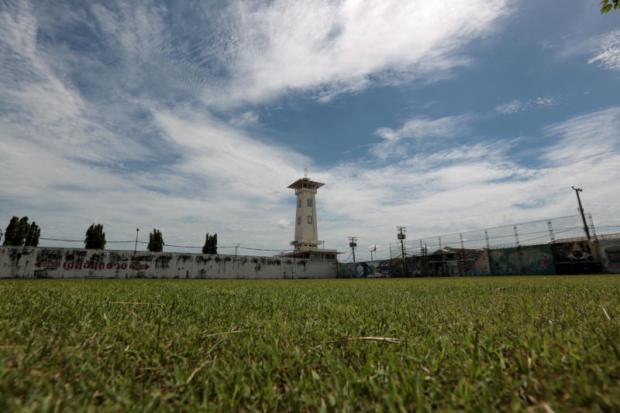
Just when people thought that capital punishment no longer exists in Thailand, a Thai criminal court recently ordered sending two repeat offenders to death row for fatally stabbing a young man during an iPhone robbery.
The Criminal Court on May 31 convicted Kittikorn Wiphana, 26, and Supatchai Chansi, 25, of the fatal robbery in Lat Phrao district in January and handed down the death penalty.
The ruling took place just a few days before the high-profile murder of Warisara Klinjui. Before the police could get hold of the suspect, Prabhasiri Somsri, a sister of Preeyanuch "Preaw" Nonwangchai who was the main suspect in the case, urged Preeyanuch, then hiding in Myanmar, to turn herself in.
"If you are listening to me, I want to say please come back and serve your time. Do not worry. Please turn yourself into the judicial system. There is no such thing as the death penalty," Prabhasiri said in a televised interview.
Prabhasiri's appeal is understandable. Prior to that, the social media world was debating what kind of punishment would fit Preeyanuch's crime. The femme fatale allegedly strangled then dismembered her friend in cold blood.
Preeyanuch turned herself in to the police a few days later. It was unclear whether Preeyanuch had seen her sister's plea on the tube or whether such a plea had anything to do with her decision.
The court has yet to give the final verdict in Preeyanuch's case. Nonetheless, the latest court case last month proved that the death penalty is still on the books in Thailand even though no execution has taken place since 2009.
Regarding the death penalty for Kittikorn and Supatchai, the court said there was no reason to commute their punishment, reasoning that they pleaded guilty only because the evidence against them was overwhelming.
The CCTV recording was solid evidence of the horrendous murder as they showed Kittikorn stabbing Wasin Luangjaem, the 26-year-old victim, several times in the torso and once in his throat before snatching his mobile phone and fleeing on a motorcycle driven by Supatchai.
Police found that the two robbers also stole from other victims on the night they killed Wasin.
The court seemed to give up on the two young men as they have been in and out of jail several times.

what about the victim?: Panadda Wongphudee is an advocate of the death penalty. Photo: Tawatchai Kemgumnerd
Records show the two men met in jail while serving time for earlier crimes. After they completed their jail terms, they allegedly carried out a series of robberies together.
Kittikorn had been arrested nine times before, the first time when he was 16.
Supatchai had seven previous convictions, beginning in 2007 for robbery. His arrests were mainly related to drug charges.
This time around, the two men are subject to the maximum penalty. The execution will nonetheless depend on the result of their appeal.
Panadda Wongphudee, a former beauty queen and founder of the Goodness Organization, a non-profit campaigning for children's right and gender equality, has been an outspoken advocate of the death penalty in Thailand.
"I do not campaign to execute anyone. But the maximum penalty should be there. Because in reality most people given a death sentence are not executed. Most receive pardons and they stayed in jail for life," she said.
Panadda is campaigning for the strict enforcement of capital punishment for rape and murder cases.
"In reality, many offenders came out of jail and committed the same crime," she said.
"I want to see serious enforcement of the law. I understand people are debating whether Thailand should have the death penalty to protect the convicts' rights but what about the victim?" she said.
To scare the would-be criminals, the authorities should show the effectiveness of the rehabilitation process if that is an answer then capital punishment is not the best solution.
"My foundation is helping a woman who was sexually assaulted in Phatthalung. It does not help that the court has tried the case for years," she said.
Instead of lip-service over the rights of convicts, the agencies involved should show they can change a person and monitor their behaviour to make society feel safe, she said.
A DIVISIVE ISSUE
The director-general of the Corrections Department, Kobkiat Kasivivat, is a straight-talking man who has worked with the Corrections Department throughout his career.
"Before I assumed the management job, I went inside the prison every day," he said, while drawing attention to the paintings of an inmate he displays in his office.

short attention: Criminologist Krisanaphong Poothakool says the legal process is too slow. Photo: Jeerawat Na Thalang
b"They were painted by an inmate who honed his painting skill in prison," he said, pointing to the oil paintings sharing the theme of running horses. "This former inmate sold his paintings through the internet and earned 5,000 baht a piece."
Kobkiat, who has seen a number of inmates put to sleep, said actual executions do not happen as often as people think. "Even after the court hands down the death sentence, it will not be immediately enforced. The defendant can seek a pardon within 60 days. And the process takes time," he said.
At present, there are around 440 inmates on death row, with around a quarter in the appeal process. He said the court often handed the death penalty to people charged with drug trafficking or premeditated homicide, which are considered serious crimes.
Capital punishment has long been a controversial issue. The United Nations is against it. But a number of countries still have the death penalty, including Thailand.
At a UN General Assembly meeting to abolish the death penalty in 2010, the Thai representative said his delegation would move from voting against the resolution to abstaining because it viewed the issue as a criminal justice issue and the right of the state to decide.
According to the UN release, the Thai representative told the meeting, "Thailand was now exploring the social dimension of the issue in its national framework and in the context of its national human rights plan. It adjusted its vote this year to reflect developments in the country. It strongly urged the group of co-sponsors, considering that an important gap still remained, not just to represent one side of the debate."
The UN stated that capital punishment should be abolished. As former UN Secretary General Ban Ki-moon once put it, "The taking of life is too irreversible for one human being to inflict it on another, and we must continue to argue strongly that the death penalty is unjust and incompatible with fundamental human rights."
"Liberals and conservatives are divided on the issue," Kobkiat said.
He refused to say he agreed with capital punishment. "I am an officer. I will do whatever I am instructed to do. If I say I disagree, people may think I am lazy," he said.
Kobkiat has seen many inmates executed in his long career. Asked what he thought about the recurrence of the debate, he said, "The issue is usually hyped up when something happens. But then, it would disappear as people are interested in another news."
"The debate reflects the emotions of society at a given time. It is not a value. Emotions come and go," he said.
He said the punishment aims for retribution and redemption. "We have to balance the two," he said.
"But right now, when society calls for the use of the death penalty for some people, the social mood wants vengeance as people get emotional because of the news," he said.
"I will not bring my personal bias to work. If we are vulnerable, we will not be able to ensure justice," he said.
Kobkiat nonetheless listed the arguments of supporters and opponents of the death penalty. >> >> People want to punish people in proportion with the crime committed to provide closure for the victim's relatives. In some cases, the life sentence is not in proportion to certain serious crimes.
From the perspective of victimology, the death penalty can help protect the victim by preventing the criminal from committing repeat offences. Besides, the death penalty can deter serious crime in the future by showing an example for would-be criminals.
In terms of the state budget, the death penalty can save government spending on inmates.
Opponents, however, argue that the death penalty would not be able to correct the miscarriage of justice in instances of wrongful convictions.
Moreover, the death penalty would have a deep psychological impact on convicts' children.
Ethically speaking, opponents of capital punishment point out that execution is not an answer to make a better person out of an inmate.
Besides, there is a debate whether the death penalty can reduce the number of crimes.
Thailand's crowded prisons do not seem to be a promising place to change the behaviour of inmates.
"Our prisons are supposed to accommodate up to 120,000 inmates. But now, we have around 300,000 inmates," Kobkiat said.
"Of course, living in the prison is not as convenient as staying home. But it is not bad. We provide the necessary supplies," he said.
Asked whether prison can change a person, he said, "It also depends on society. They can receive practical training that they can use after they serve their time. But it depends on social attitudes. Some don't want to hire ex-inmates."
Regarding ex-inmates who commit repeat offences after serving time, he said crimes can be committed by anybody. "Don't forget that there are many unknown crimes or criminals who were not caught. Of a total of 100 crimes, less than 10 result in an arrest," he said.
As of April this year, 440 inmates face capital punishment.
"But it does not necessarily mean all will be executed. In fact, courts are often lenient or eventually hand them a life sentence," he said.
The method of execution has evolved with time from firing squads to lethal injections to make death as painless as possible.
In December 2002, the Corrections Department executed an inmate by firing squad. In December 2003, the department used lethal injection to execute four inmates, three of them are related to drug charges.
On Aug 24, 2009, two convicts charged with drug-related crimes were executed by lethal injection. That was the last time inmates were executed to date, he said.
But it does not mean a sinful man cannot be redeemed. Kobkiat cited the case of former gynaecologist Wisut Boonkasemsanti, who killed his wife in 2001. Originally, he was sentenced to death. However, due to his behaviour, he was released after serving 10 years and seven months behind bar.
After he was released, Wisut became a respected monk. "Look at what Dr Wisut has become after prison," said Kobkiat.
SLOW JUSTICE
Krisanaphong Poothakool, a criminologist at Rangsit University, said courts often order the death penalty for serious crimes such as rape and murder.
"But we have to look at the matter from two perspectives. What drives a person to the crime? Is it their upbringing? If that is the case, why don't the agencies responsible for domestic violence correct the situation early on? The death penalty addresses the end cause of the problem," he said.
Supporters of capital punishment may think an eye for an eye may stop the crime. But the statistics suggest otherwise. Countries with the death penalty still have high criminal rates, said Krisanaphong.
Besides, the death penalty would not correct wrongful convictions. He cited the Sherry Ann murder case in which three persons spent 13 years in jail because they were wrongfully convicted of murdering a Thai-American teenager.
One of the three died in jail. The authorities later discovered they had put innocent people behind bars.
The image of a man strapped to an electric chair may not be as effective a tool to scare would-be criminals as the swift and effective enforcement of the legal process, Krisanaphong said.
"If we proceed with the case with swift action to let would-be criminals see the consequences when the news is fresh in people's minds, that would deter people from committing serious crimes," he said.
"Currently, the legal process is too slow to show the results. The incident becomes hot news for a few days after the suspect is arrested and there's a debate over what penalty would fit the crime.
After that, the legal process is too slow and the media loses interest in the case and so have the public," Krisanaphong said.

death chamber: Inside the chamber at Bang Kwang prison where executions by lethal injection take place. There are around 440 inmates on death row in Thailand. Photo: Pornprom Satrabhaya

death row: Kittikorn Wiphana, right, and Supatchai Chansri leave the Criminal Court before heading back to prison after they were sentenced. Photo: Pornprom Satrabhaya

slow justice: Kobkiat Kasivivat, director-general of the Corrections Department who has seen a number of inmates put to sleep, says executions do not happen as often as people think. Photo: Pornprom Satrabhaya
